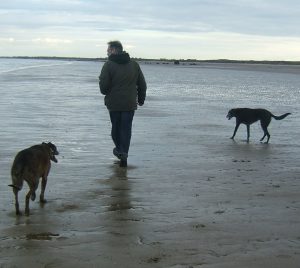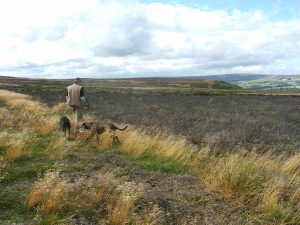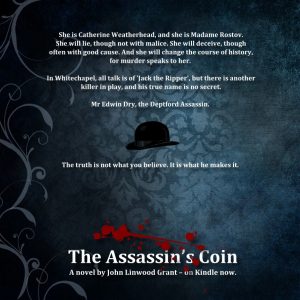A treat for everyone today, for we are privileged to have a rare interview with author and wild child John Linwood Grant, in which he quizzes himself about his writing, and the price of soap these days, along with invaluable tips for the younger writer.

Many texts have been written about the extraordinary literary talent that is John Linwood Grant, who some critics are calling “That odd-looking man on the bench over there”. We need hardly mention the reams of analytical papers on his groundbreaking work. So we won’t. The Guardian newspaper once described him, after a harrowing photo-session, thus:
“His eyes are the colour of yesterday, his only weapon a beard which has seen wondrous things. Great hounds surge in a wave before him. If he is still sane, it is because he has stared into the abyss and then forgotten why he was doing so. Thus a gentle incompetence protects him, and always has.”
THAT INTERVIEW
John: Thank you for joining me, John. Tell us a bit about yourself, to warm things up.
John: It’s a pleasure. I was about to go to the toilet, but I might have a few minutes to spare. What is there to say which is not already included in Hamed Pasha’s seminal biography of me, ‘So I Met This Bloke with a Shopping Trolley’, last year? I suppose few readers are aware of my early career in the Parachute Regiment – I’m certainly not aware of it at all. Or my meeting in 1976 with an old Bulgarian lady who offered me a suspicious boiled sweet on a night train near Sofia. These are perhaps the moments which define us.
John: And I believe you are kept by dogs?
John: Yes, I currently belong to two lurchers, but they provide me with a reasonable degree of freedom, given my poor house-training. It’s what my mother would have wanted, although I think she would have had me neutered earlier – she never liked me spraying the furniture.
John: Indeed, indeed. Now, to your fiction. Do you prefer the short form, or the freedom allowed by novels?
John: Well, novels are better for balancing a wonky table, but stories make excellent firelighters. As for writing them, I enjoy the short story as a way of making not much money quite quickly, and the novel for making not much money over a far longer period. It is also true that in a novel, you have the room to put in all the bits that you would have left out of a good, pithy short story, thus wrecking it in the process.
John: A useful insight. What would you advise the writer who is at an early stage in their career?
John: There’s so much, isn’t there? Not expecting a career is one thing. Then… putting the words in the right order can help; semi-colons can turn a pulp tale into literary gold – as far as most editors know. Only include the sound of helicopter blades in a flashback if your character really spent military time in Vietnam – it doesn’t work so well if your protagonist is a spinster from Guildford who’s mostly interested in cantilever bridges.
And always seek diversity in your cast of characters – you can never have too many Belgians, for example. Insert a token black Belgian, and you have the big publishers eating out of your hand.

John: I hope that many will digest those points. And how about the writer and social media?
John: Yes, it’s very important nowadays to be seen on all forms of social media. I always tell other writers that they should make endless self-promotional posts without pause, ignore other people’s work, butt in on otherwise polite conversation threads with wild, inaccurate statements, and demonstrate no sense of humour. I recommend this because it makes me look slightly better by comparison. And if you do end up in contact with authors and editors who have credibility and influence, always comment on every single post they make with ‘You are SO right’, no matter what they said.*
John: You make all your own memes, I gather.
John: I have to. The High Court case on my use of other people’s memes for the purpose of money laundering and international investment fraud is on-going, sadly.
John: Where do you stand on female writers in horror and weird fiction?
John: That’s a complex issue, which involves long consideration of changing societal norms, historical patterns of gender roles, and the inalienable right of individuals to self-determination. I would summarise my view by saying that many female writers are far too good, and should be put back into the factories to work on munitions. Or conscripted. All this competition is hard work. If I have to fraternise with them, I generally try to smile and steal their notebooks.
John: Looking at the bigger picture, what would you say, as a writer, is the underlying theme, the leitmotif of your oeuvre?
John: Not having enough money to buy a bigger picture. Oh, and not being able to clean my trousers properly has always obsessed me. That and the price of chicken carcasses. I try to explore these in most of my stories, except when I’m writing the weird and strange stuff that actually sells. Is an oeuvre some kind of foreign egg?
John: Yet when you were younger, your tales often turned on identification of that common core of humanity which makes us question our own beliefs and actions, did they not?
John: That was a phase, nothing more. I had the naive belief that characterisation was a key to drawing readers into the experiences of others. My series ‘Byzantine Pastry-making and the Role of the Sultana to 330 CE’ soon got me past that. And pale ale – that helped.
John: I also notice that you occasionally stray into pastiche. Is that an area of writing you enjoy?
John: Oh, enormously. Stealing other people’s pre-existing characters and occasionally giving them a different hat to wear, or having a Zeppelin fly past in the wrong era, is a hugely satisfying process. Most stories can be enhanced by writing ‘guv’nor’ and shoving everyone into a hansom cab now and then. Detailed research is vital, though – some copyright laws can be damned tricky, and you don’t want to be caught by the lawyers. My book ‘Buffy the Umpire Slayer’ taught me that.
John: Fascinating. Alas, we are out of time. Did you want to go to the toilet now?
John: I’m afraid that I dealt with that while we were sitting here, thanks. Might I mention my latest novel before we close.
John: No.
*If you have been affected by these issues, or really believe that this advice is useful, please seek help.
UK – Kindle now; Pb 10th October http://amzn.eu/d/fsKVxU8
US – Kindle now; Pb 10th October http://a.co/d/5Y3Kh4e
